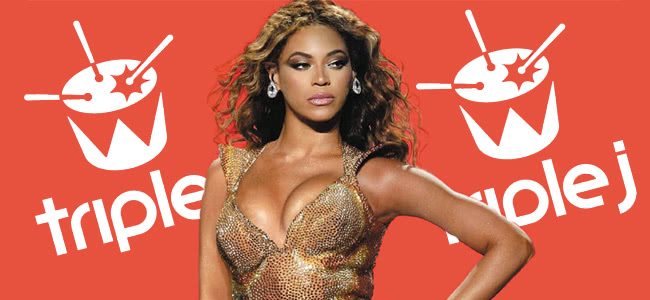No matter what they do, controversy just seems to follow triple j around. Call it one of Australia’s longest running culture wars, but everyone’s got an opinion on what the country’s national youth broadcaster does right and what they do wrong.
Sure, most listeners are content to just let the station do its thing, but others will tell you it’s become a shell of its former self, simply mimicking the pop charts and betraying its roots as a station serving the local music community.
They’ll say the triple j pendulum has swung completely in the direction of chart-approved pop music and it’s all thanks to the station’s music director, Richard Kingsmill, who’s single-handedly responsible for the downfall of what was once a great Aussie broadcaster.
Social media abounds with comments like “I honestly can’t tell the difference between triple j and Nova anymore”. Of course, if one were to look at the station’s playlists, it’s easy to see that the station is one of Australia’s most diverse and passionately local.
However, it’s also true that in recent years it’s become far more pop-friendly. Indeed, the traditional image of triple j may be all alt-rock and live from Big Day Out, but just as the local festival scene has changed, so too has triple j.
Not only do bonafide chart-topping pop stars like Drake and The Weeknd get airplay on triple j, they came in at No. 9 and No. 14 in the latest Hottest 100, respectively. Of course, there are certain curatorial decisions made on just what pop gets the j tick of approval.
What those decisions are, no one knows exactly, and therein lies the rub. Since triple j’s playlist is subject to the decisions made by station higher-ups, including Richard Kingsmill, fans are often left confused by what they hear coming through their speakers (and what they don’t hear).
For example, most will remember the massive controversy that erupted in the lead-up to last year’s Hottest 100 after BuzzFeed launched a viral campaign to see Taylor Swift’s pop hit ‘Shake It Off’ make it into the Hottest 100.
Lets hope some triple J listeners don't slam Triple J for playing Beyonce for the pure fact it's Beyonce
— Gabs ✨ (@Gxbriellemxry) April 27, 2016
I can only hope triple j listeners respond well to that beyonce track so they actually play more of her and other female musicians of colour
— z train (@ZaneJD) April 27, 2016
Wow. Triple J have added the Beyonce album. Amazing.
— Matt Cannings (@matt_cannings) April 27, 2016
Beyonce is just as commercial as Taylor just an fyi Triple J
— annie armenian (@anniea89) April 27, 2016
"Is the new Beyonce album hahal?" – disgruntled rural Triple J listener, 2016
— LEVINS (@levdawg) April 27, 2016
Triple J stopped played Kylie when she got too commercial; most of the new Beyoncé isn't commercial at all. Playlisting it makes total sense
— spicy cinnamon taco (@Caitlin_Welsh) April 27, 2016
The silly viral stunt proved a cultural flashpoint and sparked a debate over just what is appropriate for triple j and why. On the one hand, Taylor Swift is a millionaire pop star with legions of fans and ubiquitous mainstream radio play, on the other hand, Drake and The Weeknd.
In fact, that same year everyone made a big stink about Taylor Swift (she was eventually disqualified from Hottest 100 contention by triple j), Sia, another pop-friendly artist, made the top 10 of the Hottest 100 with her mega-hit ‘Chandelier’.
So why is all of this important? Well, because this week saw the station add Beyonce’s Lemonade to high rotation. Arguably the world’s biggest pop star besides maybe Swift, Queen Bey’s latest album got a surprise release over the weekend.
The album was immediately hailed as a rare and mature work of art and a surprisingly personal statement by the former Destiny’s Child principle. It quickly inspired just as many op-eds as it did rumours, whilst gaining international mainstream airplay.
It’s certainly up for debate, but one could argue that Beyonce, and indeed Drake, Sia, The Weeknd, and other pop artists beloved by triple j, like Kanye West, occupy a particular arena of the pop sphere that commands a certain level of artistic respectability and integrity not shared by the likes of, say, Katy Perry.
[include_post id=”475893″]
But one could also argue the same for Taylor Swift, whose last album, 1989, was praised as a pop music masterpiece, garnering positive reviews from the likes of The Guardian, Rolling Stone, and being named one of the best albums of 2014 by Pitchfork.
But there was no love for Swift from triple j, nor for Justin Timberlake, whose brand of stylish, hyper-sexual, confessional pop cum R&B arguably paved the way for artists like Drake and The Weeknd. Likewise, Carly Rae Jepsen, whose 2015 album Emotion garnered sterling reviews, was left off triple j playlists.
Are we saying that triple j should play Justin Timberlake and the girl who did ‘Call Me Maybe’? No, but the question of just what pop music both triple j and we the listeners deem ‘triple j appropriate’ is an interesting and perhaps important one to ask.
Triple J's @zanrowe discusses Beyonce’s politically charged and deeply personal new album and Prince’s legacy https://t.co/0wGobk6pPI
— News Breakfast (@BreakfastNews) April 27, 2016




































